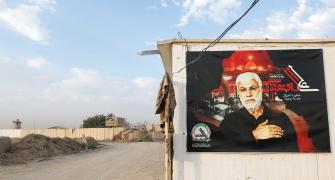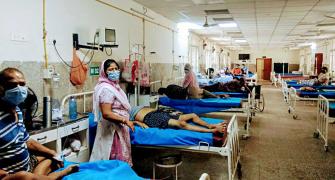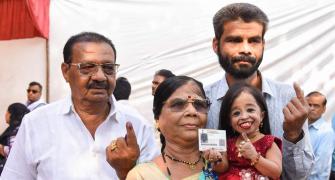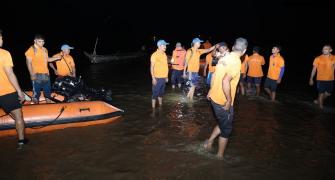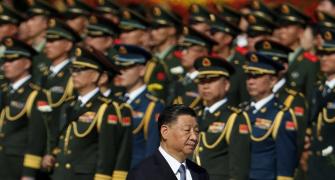His experience in Sri Lanka gives him an edge in understanding of the ethnic conflict. Here is his latest commentary on the unfolding tragedy for Sri Lankan Tamils. In an e-mail interview with rediff.com's Sheela Bhatt the colonel provides his insight into the war tactics adopted by the Liberation Tigers of Tamil Eelam and other relevant issues.
Do you think the plight of 180,000 lakh Sri Lankan Tamils could have been avoided by the Sri Lankan army while taking on the LTTE?
Isn't it quite different from the Indian Army's handling of similar situations in the northeast, Punjab or Kashmir at various point of time?
Both the LTTE and the Sri Lankan army are responsible for the crisis regarding civilians trapped in the war zone. And the civilians are also partly to blame for the situation developing into a crisis. The civilian population involved is a mixed bag of LTTE supporters and their families, families of LTTE members, ordinary people, and officials of various kinds.
The convergence of civilians into LTTE-held areas started when the war advanced slowly from Mannar district but it spread after the fall of Paranthan-Kilinochchi. The civilians fled at the behest of the LTTE because they were scared of their treatment at the hands of the Lankan army and they were still hopeful that the LTTE would hit back.
When the war intensified further, at the request of the Red Cross, it was the Sri Lanka government that declared a safe no fire zone first in an area east of Mankulam. Then it was shifted further to the interior as the army succeeded in pushing back the LTTE dramatically.
In all these stages of war for nearly six months, the LTTE could have allowed the civilians leave the territory now becoming a war zone.
It did not because traditionally the LTTE considers civilian involvement in war as part of its method. Civilians provide some of the administrative cover that would be provided in normal armies. Regular armies also muster civilians for assistance in construction of defences, running supply convoys, medical cover etc.
So civilians are part of the LTTE concept of war. Civilian casualties provide good stories for LTTE propaganda.
The Mullaitivu area was probably selected as the final no fire zone because the land strip provides access only from three directions and sea access was available. This is useful in controlled evacuation. At least theoretically. But the evacuation requires the concurrence of both warring sides. The LTTE to this day had not agreed to their evacuation.
It is in the nature of war that civilians in the vicinity of fighters would get killed. Both sides are fighting to save themselves and kill the other so they don't bother about civilians getting killed in between. This is the sad reality of war.
The Lankan army could have avoided the use of heavy artillery (which the LTTE used throughout) and air strikes.
We avoid this even in J&K as far as possible. But it is matter of war doctrine. And the Lankan army believes, like the Americans, in the use of superior firepower and force in its counter-terror ops (operations). This is what has happened. I don't think it could have been avoided except some effort to separate both the warring sides with a third neutral force and then evacuate the civilians.
America had offered to send the Marines to assist such a process but as it is matter of sovereignty and the Lankan government did not agree. I believe India also did not relish the idea.
So for nearly four months everyone knew this crisis was building up. I had written about it then as many had done. But everyone -- the LTTE, the Lankan government, India, and the international community including the Tamil Diaspora -- wished it away or were pursuing their own agenda. So it is a logical culmination of a developing crisis.
We should not compare Sri Lanka with our situations in the northeast or other insurgency areas. There is a lot of public apathy in India because it is a vast country with lots of diversity and we don't bother so much if a train explodes in the northeast and say 30/40 people are killed. Of course, if three are killed in Chandni Chowk in Delhi it is different.
Our counterinsurgency wars appear to have no deadline. We carry on from one generation to another. And our tactics are more humane. But Sri Lanka is a small country with both the warring sides at it relentlessly for 25 years.
President Mahinda Rajapakse wants to end it now. So I don't think it will be possible to emulate our approach in Sri Lanka.
The LTTE is unique and much deadlier than all the militant bodies we face, we should not forget that.
Can you put in context the Sri Lankan government's announcement that it will not use heavy ammunition? Does it mean the military operation is almost over? They have not used the word ceasefire... so what do they mean in military terms?
I think this is the Sri Lankan response to the growing calls for a halt to the war to save civilians still trapped in the no fire zone. One of the main accusations against Sri Lanka, as stated by the United Nations agencies and international NGOs, is that during the war it had been using heavy weapons and air strikes causing huge civilian casualties in the no fire zone.
In fact, the UN has put the figure of such civilian deaths at over 6,000.
Sri Lanka had been denying this. It has been saying that it was only returning LTTE fire. However, the issue has become a major cause of humanitarian concern not only for Tamils all over the world, but most nations. It is a source of international embarrassment for Sri Lanka.
For all of us in India it had been heartbreaking, tragic news. The US has come out with a strong statement. Three European foreign ministers are visiting Sri Lanka because of this issue. The latest Sri Lankan announcement could be to satisfy, at least partly, some of these concerns.
Apart from the above non-military reasons, the operation has reached almost the goal post. The security forces are within six km of the last LTTE position. There is really no requirement for air strikes. The LTTE positions are probably within range of infantry battalion weapons like machine guns, mortars, grenade launchers, and recoil-less rifles. And probably the LTTE also lost all its artillery assets by now and artillery retaliatory fire might not be required.
Of course, if the security forces do not use artillery during the final assault, they would suffer more casualties because they would inflict fewer casualties on the LTTE.
However, the moot point is that all the infantry weapons are capable of killing any civilians within their range because the operational area is so restricted. So while the casualties might be less, the threat to civilians there exists.
Lastly, the war has not ended with the latest Sri Lanka announcement. The operative words in the statement indicating future course of action is: 'Our security forces will confine their attempts to rescuing civilians who are held hostage and give foremost priority to saving civilians.'
In Sri Lanka's official parlance that means the war would continue because it has always claimed that the objective of the war is to liberate the people held hostage by the LTTE. So the war would continue probably at a slower pace, perhaps less dramatically, provided the LTTE can still sustain.
Was India's assistance to the Sri Lankan military pivotal in any manner for their military victory over the LTTE?
If pivotal means indispensable, no. If India had not provided training assistance and radar and other non lethal equipment Sri Lanka would have got it from China and Pakistan. But Indian intelligence was vital just like US intelligence inputs particularly regarding LTTE shipments.
Moreover, under the current protocols on combating terror, Sri Lanka could have demanded information from India, we could have prevaricated as Pakistan is doing. But why should we?
We are not obliged to help out the LTTE, a banned organisation in India and 31 other countries.
India should not confuse fighting the LTTE with fighting for the Tamil cause because the LTTE forfeited that expectation when it fought a needless war with India and alienated its support.
India should always support the Tamil struggle for equity. And it should oppose the LTTE's leadership because it has brought only misery.
Don't you think if the Indian government had done some coercive diplomacy some 18 months ago, Sri Lankan Tamil interests would have been better served? It's said that they have been used by the LTTE and uncared for by the Sri Lankan government. Isn't it so?
There is little we could have done because we wished away all our interest in Sri Lanka after the IPKF mishandling and the Rajiv Gandhi assassination by the LTTE. We as a nation did not want to be part of the peace process initiative in 2002. And for Tamil Nadu politicians this was a non issue then because LTTE was the cock of the heap.
Nobody really cared about Sri Lanka (including the Indian media) unless there was a dramatic suicide attack. Leverages come with initiatives. In Sri Lanka we had shown only trade interests, not national strategic interests. So this has been exploited by the LTTE to remain the sole spokesman of Tamil interests; and the Sri Lanka government had in turn found it a cosy situation.
Actually on assuming office, Rajapakse wanted India to join the co-chairs of the peace process and India did not take up the offer. So in a sense India, including the Tamil Nadu politicians, now crying foul failed to protect Tamil interests in Sri Lanka.
Do you think the LTTE will go back to their original tactics of guerrilla war?
Do they have a choice? Prabhakaran if he survives will have to go back to the basics. He is good at it. But at 54 it is a bit difficult to wage war and renew yourself after every defeat.
I think in the next six months the LTTE guerrillas will reappear. They may not be powerful but there will be gore and drama. India should also watch out where they grow.

